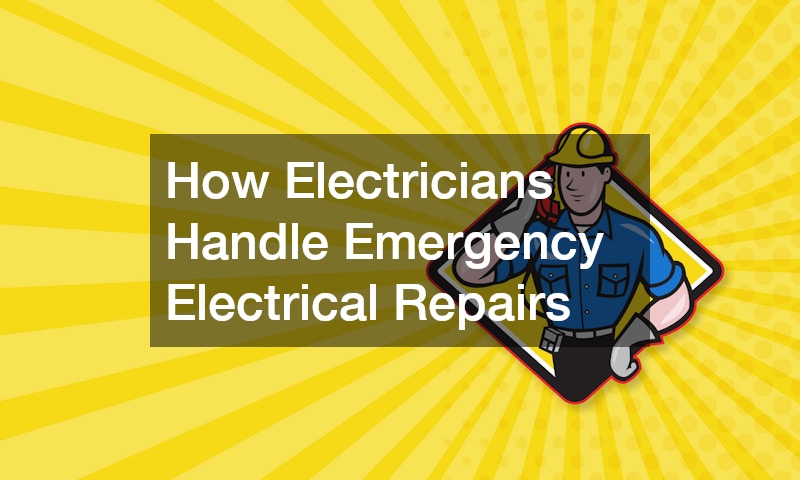In emergency situations, swift and effective action is crucial when it comes to electrical repairs. This article explores how electricians manage emergency electrical repairs, focusing on standard practices, challenges, and the importance of professional intervention.
What Are the Most Common Emergency Electrical Issues?
Electricians frequently encounter a range of emergency electrical issues that require immediate attention. One common issue is power outages, which can be caused by storms, faulty equipment, or overloaded circuits.
Another severe problem electricians often confront is that of electrical fires, typically resulting from faulty wiring or overloaded outlets. Additionally, exposed wires and electrical shocks pose critical hazards requiring emergency intervention. Understanding these common issues enables both electricians and homeowners to be better prepared for unexpected situations.
During emergencies, electricians must swiftly identify the problem to mitigate risk and commence repairs. The knowledge of prevalent issues like power surges, tripped breakers, and blown fuses aids in quicker diagnosis and resolution. By focusing on these common problems, electricians can standardize their approach to emergency repairs, ensuring safety and efficacy. Homeowners also benefit from being aware of these issues, allowing them to notice warning signs early on and call professionals accordingly. This mutual understanding forms the foundation for managing electrical emergencies effectively.
How Do Electricians Prioritize Emergency Repairs?
Electricians prioritize emergency repairs by assessing the severity and potential impact of the situation. The first step typically involves evaluating the safety risk, as life-threatening issues like electrical fires or exposed live wires must be addressed immediately. Next, electricians consider the number of affected individuals, prioritizing repairs that restore electricity to vital areas such as hospitals or schools. Additionally, potential damage to property is evaluated, with electricians working to prevent further deterioration that could result in costly restoration. This assessment process allows electricians to manage their time and resources efficiently during emergencies.
Efficiency in prioritizing repairs is essential for managing multiple emergency cases effectively. Electricians often use a triage system similar to those in medical settings, categorizing repairs by urgency to allocate resources appropriately. This system helps ensure that the most critical issues are handled first, minimizing danger and preventing escalation. Electricians also maintain communication with clients to provide updates and manage expectations regarding repair timelines. By using a structured approach to prioritization, electricians maintain order and efficiency during chaotic emergency situations.
What Safety Measures Do Electricians Take During Emergency Repairs?
Safety is of the utmost importance when electricians are tasked with managing emergency repairs. To protect themselves and their clients, they employ a variety of safety measures designed to minimize risks. Personal protective equipment (PPE) is essential; electricians wear insulated gloves, safety goggles, and electrically-rated boots to shield against electrical shocks. Furthermore, electricians follow strict safety protocols such as de-energizing circuits before beginning repairs to eliminate the risk of accidental shocks. These measures ensure that the repair process is conducted without endangering anyone involved.
Electricians are trained to identify potential hazards and create a controlled environment to safely execute repairs. They use tools that are specifically designed for electrical work, such as insulated pliers and voltage detectors, to prevent accidents. Additionally, electricians are well-versed in emergency procedures, such as CPR and the use of fire extinguishers, to handle unforeseen incidents effectively. Continuous education and adherence to updated electrical safety codes ensure that electricians remain well-prepared for any emergency scenario. By employing these comprehensive safety practices, electricians maintain high safety standards in their work.
How Can Homeowners Prepare for Electrical Emergencies?
Preparation is a crucial factor in minimizing the risks associated with electrical emergencies. Homeowners can take proactive steps to safeguard their families and properties by understanding their electrical systems and recognizing signs of potential issues. Regular maintenance checks performed by professional electricians can identify vulnerabilities in the system, such as outdated wiring or faulty outlets. Additionally, homeowners should educate themselves on basic electrical safety practices and emergency procedures to respond effectively when situations arise. Knowing when to call a professional is pivotal—attempting complex repairs without expertise can exacerbate problems.
Equipping homes with essential emergency tools and information is another vital aspect of preparation. Installing smoke detectors and fire extinguishers in strategic locations can prevent minor issues from escalating into significant disasters. Keeping a detailed list of electrician contact numbers and emergency services ensures that help is readily available when needed. Regularly reviewing this information with family members fosters a collective understanding and readiness. Protective measures like surge protectors and secure electrical outlets also contribute to mitigating potential hazards, reinforcing the home’s overall safety framework.
Electricians play a vital role in handling emergency electrical repairs, ensuring safety and efficiency throughout the process. By understanding how they operate, both homeowners and electricians can work collaboratively to address electrical issues promptly and effectively. Preparedness, prioritization, and stringent safety measures are fundamental to the successful management of electrical emergencies. As society continues to rely heavily on electrical systems, the expertise of electricians remains invaluable in safeguarding our homes and communities. Moving forward, continuous learning and proactive measures will be essential in navigating the evolving landscape of electrical systems and potential emergencies.


